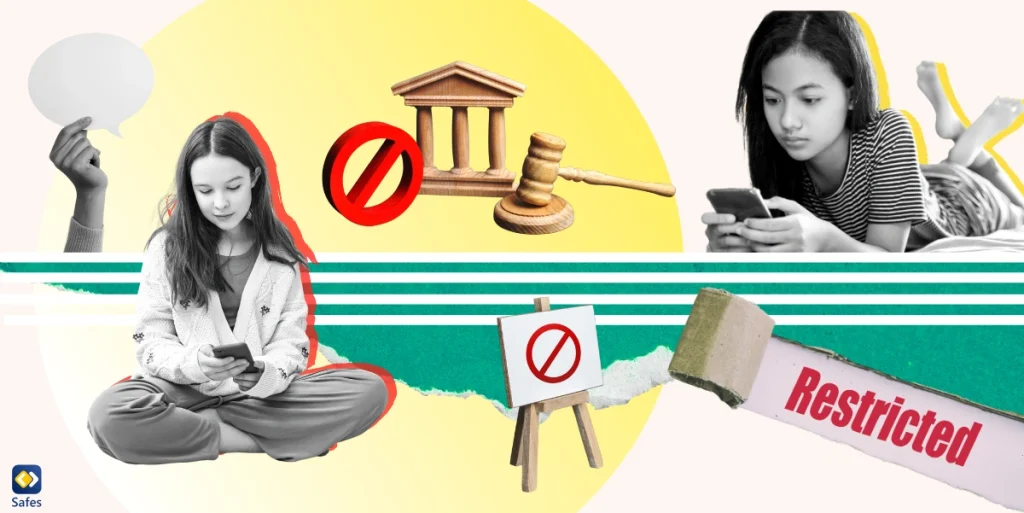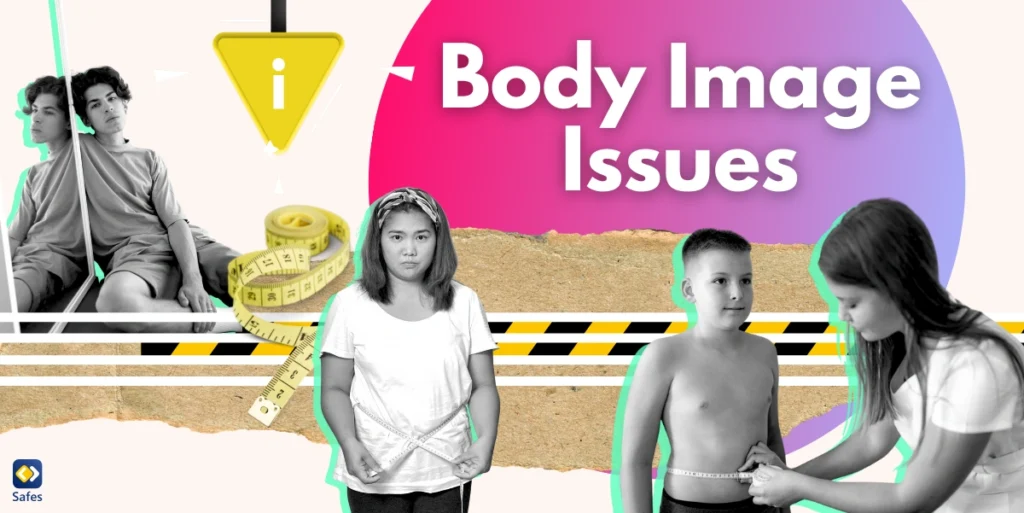The proliferation of cell phones and the internet has transformed how we communicate, bringing new challenges and concerns, especially for parents. One such concern is sexting, a term that refers to sending or receiving sexually explicit text messages, photos, or videos via electronic devices. While sexting among consenting adults is generally legal, it becomes a complex and potentially illegal activity when it involves a minor. This blog post aims to answer the question, “What are sexting laws?” providing parents with a comprehensive understanding of the laws, risks associated with sexting, and practical advice on protecting their children.
Download and Start Your Free Trial of the Safes Parental Control App
Laws About Sexting
Sexting laws vary by jurisdiction, but they generally focus on the creation, distribution, and possession of sexually explicit images of minors. Under child pornography law, nude pictures or sexually explicit photos of someone under the age of 18 are considered child pornography, regardless of the context in which they were taken or shared. This means that teens engaging in teen sexting—say, 14-year-olds sending nudes, even if willingly sharing their own images, could face child pornography charges.
As Axis explains in their parents’ guide to sexting:
“In the US, if the sexting occurs between two consenting adults (18+), then it’s not illegal. But if it’s between minors, it’s possible that child sexual exploitation and child pornography laws could come into play. But the law hasn’t been able to keep up with technology, so in instances where a teen takes a photo of him/herself and shares it with others, he/she could be considered both the perpetrator and the victim (and there are steep consequences for perpetrators of child pornography). And, if your child is 18 and sexting with someone who is 17 or 16, your child would be tried as an adult (not a minor) if charges are filed.”
Can You Go to Jail for Sending Nudes?
The penalties for sexting that involves a minor can be severe, ranging from misdemeanor charges to felony charges, depending on the nature of the offense. Convicted individuals may face jail time, hefty fines, and even registration on the sex offender registry, which can have long-lasting effects on a person’s life, including employment opportunities, education, and housing.
In some states, laws specifically addressing teen sexting have been enacted to differentiate between consensual sexting among teens and more predatory behaviors by adults. These laws aim to reduce the harsh penalties for teens who engage in sexting without diminishing the seriousness of sex crimes involving minors.

Juvenile Penalties for Sexting
When juveniles, individuals under 18, commit crimes, they are processed through the juvenile justice system. This system allows judges considerable flexibility in determining penalties for serious offenses, including sexting. Possible consequences for juvenile sexting offenders include verbal warnings, fines (e.g., Florida imposes a $60 fine for first-time offenders), community service, counseling or educational classes, probation with conditions like staying in school and reporting to a probation officer, and detention which could mean placement in a detention center, home confinement, or a group home.
Adult Penalties for Sexting With a Minor
If a person is 18 or older and involved in sexting, they can be charged as an adult, facing harsher penalties, particularly if convicted of child pornography. These penalties include potential prison sentences of five years or more for child pornography convictions, with all felony convictions carrying the possibility of at least a year in prison. Fines for sexting crimes, especially child pornography charges, can exceed $5,000. Convicted adults can also be placed on probation for at least 12 months or more. Furthermore, adults convicted of sexting crimes are required to register as sex offenders, a process overseen by police that involves tracking the individual’s residence and notifying authorities of any address changes. The duration and specifics of sex offender registration vary by state but often last for at least ten years.
The Risks of Sexting
Beyond the legal implications, sexting poses several risks to minors. The consequences of sending inappropriate pictures and videos can include unwanted attention from predators, cyberbullying, and emotional distress. Additionally, once sexually explicit images are shared, they can be challenging to control. They may end up in the hands of unintended recipients, including revenge porn websites.
- Related Article: 6 Risky Sexting Apps Parents Need to Know
Practical Advice for Parents
As a parent, it’s crucial to educate your child about the potential risks and consequences of sexting. Here are some practical tips to prevent and control the consequences of sexting:

Open Communication: Foster an environment where your child feels comfortable discussing sensitive topics like sexting and sexual activity. Educate them about the legal and emotional implications of sharing sexual images.
Set Boundaries: Discuss appropriate internet and cell phone use. Establish rules about what content is acceptable to share online and the importance of privacy.
Teach Digital Responsibility: Encourage your child to think critically about the permanence of digital content and the potential consequences of their online actions.
Know the Laws: Familiarize yourself with the sexting laws in your jurisdiction and the potential penalties for sexting involving minors.
Provide Support: Let your child know that they can come to you if they’re ever in a situation related to sexting or if they’re feeling pressured to share sexual images. Offer your support and guidance on how to handle the situation.
Monitor Internet Use: While respecting your child’s privacy, being aware of their online activities is essential. Tools like the Safes parental control app can help parents monitor and control their children’s internet use, providing peace of mind and an additional layer of protection against sexting and predators.
Introducing the Safes Parental Control App
To assist you in protecting your child from the dangers of sexting, the Safes parental control app offers a comprehensive solution. With Safes, you can monitor your child’s internet use, including social media and messaging apps, where sexting often occurs. The app provides features to block inappropriate content, set screen time limits, and receive alerts about potentially risky behavior.
By using Safes, you can take a proactive approach to educate and protect your child from sexting and the associated legal and emotional risks. The app serves as a valuable tool in the ongoing effort to keep children safe in the digital world.
Feel free to start your Safes free trial. You can download Safes from major app distribution platforms like Google Play and App Store.
Also, you might find the instructions below helpful. We’ve compiled comprehensive guides on setting up default parental controls across various devices. Whether your child is using Android, iPhone, Mac, or Windows, our step-by-step resources will enable you to create a safer digital environment for your family. Click on the links below to access tailored instructions for each device:
- Windows parental controls
- Macbook parental controls
- Android parental controls
- iPhone parental controls
Conclusion
Understanding “What are sexting laws?”, recognizing the risks, and taking proactive measures are essential steps in safeguarding our children from the potential consequences of sexting. Open communication, setting boundaries, monitoring internet use, teaching digital responsibility, knowing the laws, and providing unwavering support are key strategies you can employ as a parent. Furthermore, leveraging tools like the Safes parental control app can significantly enhance your efforts to protect your child by offering comprehensive monitoring and control features.
As we navigate this digital era, it is our collective responsibility to ensure our children’s safety and well-being in the virtual space, empowering them to make informed and responsible decisions online.
Your Child’s Online Safety Starts Here
Every parent today needs a solution to manage screen time and keep their child safe online.
Without the right tools, digital risks and excessive screen time can impact children's well-being. Safes helps parents set healthy boundaries, monitor activity, and protect kids from online dangers—all with an easy-to-use app.
Take control of your child’s digital world. Learn more about Safes or download the app to start your free trial today!




